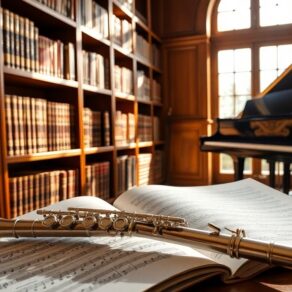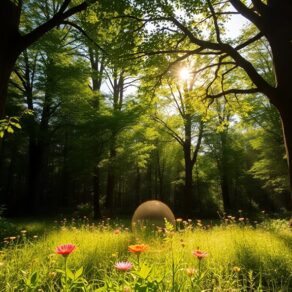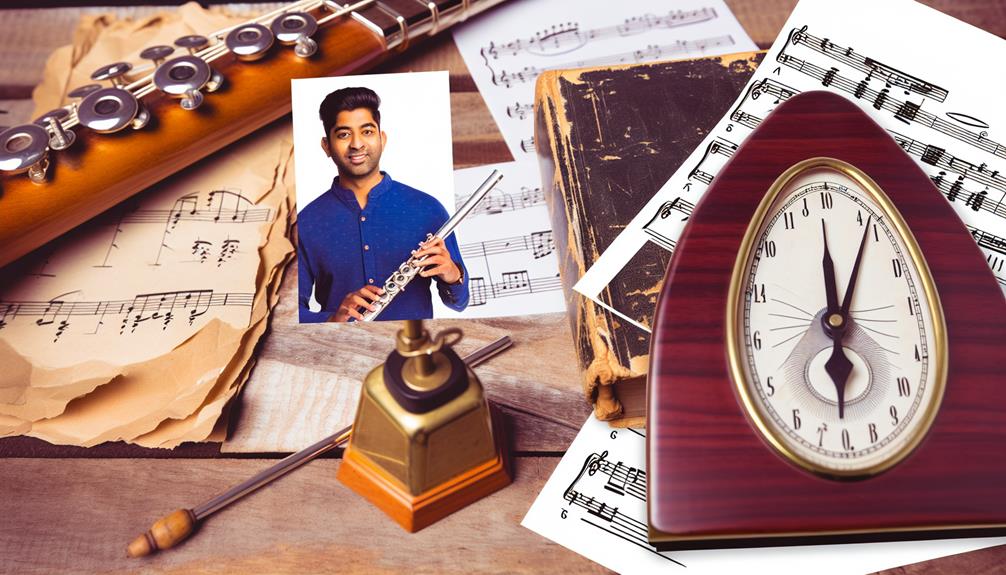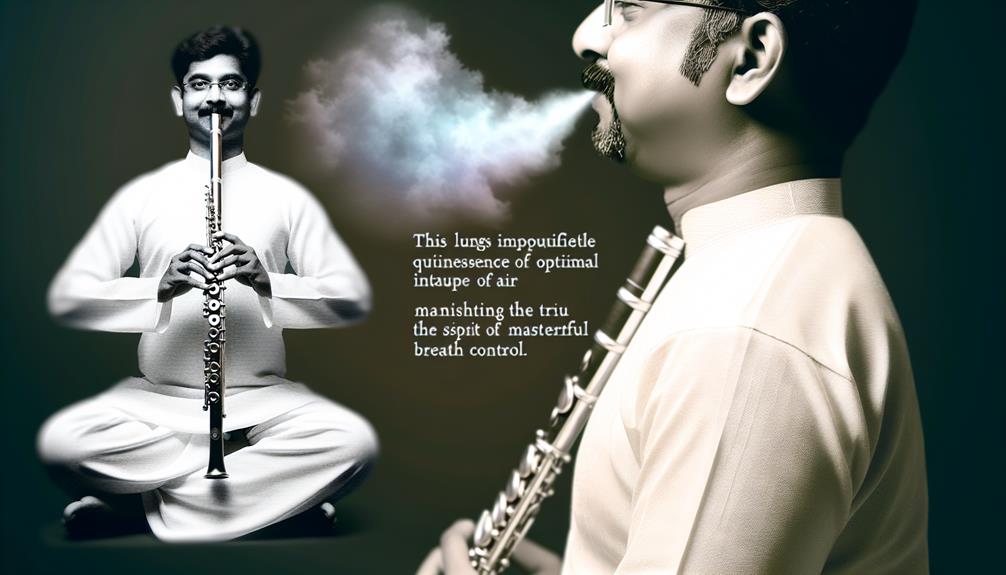If you're exploring modern flute composers, you should definitely know Ian Clarke, Kaija Saariaho, and Philip Glass. Clarke's innovative techniques like multiphonics create breathtaking soundscapes, while Saariaho's minimalist approach explores texture and intimacy. Glass's repetitive motifs transform the flute into a voice of personal expression. Don't overlook Jennifer Higdon, whose emotional depth complements her technical challenges, or Edgard Varèse, a pioneer encouraging expanded techniques. André Jolivet and Brian Ferneyhough push the boundaries even further, blending complexity with spiritual elements. Each composer invites you into a rich world of contemporary flute music that's truly worth your time to explore.
Key Takeaways
- Ian Clarke is celebrated for his innovative compositions featuring extended techniques, creating vivid imagery and emotional responses in works like "The Great Train Race."
- Kaija Saariaho explores sonic textures and intimacy in her minimalist-inspired flute repertoire, with notable pieces such as "Ciel d'hiver" and "Aile du songe."
- Philip Glass is renowned for his minimalist style, incorporating repetitive motifs and harmonic shifts in his "Concerto for Flute and Orchestra."
- Jennifer Higdon blends lyrical melodies with complex rhythms, pushing the flute's capabilities in works like "Concerto for Flute" and "Rapid Fire."
- Edgard Varèse, a pioneering figure, encourages exploration of traditional and experimental techniques in works like "Density 21.5," redefining flute possibilities.
Ian Clarke
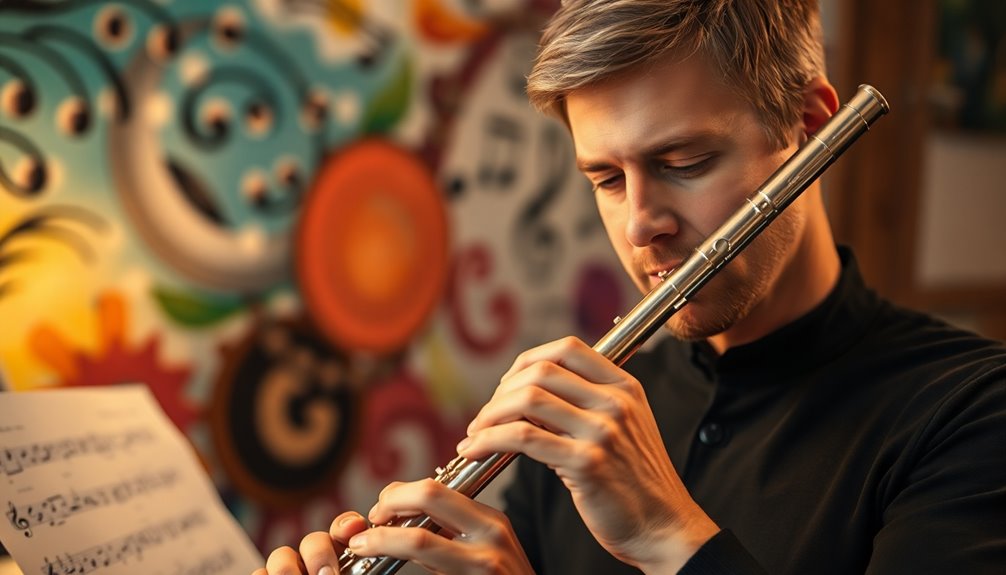
Ian Clarke stands out as one of the most innovative composers for the modern flute, pushing the boundaries of the instrument in ways that resonate deeply with both performers and audiences. His mastery of flute techniques is evident in his compositions, which often incorporate extended techniques that challenge traditional playing.
You'll find that Clarke's works invite flutists to explore sound in new ways, such as multiphonics, flutter-tonguing, and even vocalization, blending the instrument's capabilities with expressive depth.
Clarke's contribution to contemporary repertoire is significant, creating pieces that not only showcase technical prowess but also evoke emotional responses. His compositions, like "The Great Train Race" and "Zoom Tube," offer a fresh perspective on flute music, engaging listeners with vivid imagery and storytelling.
As a flutist, you may feel a sense of belonging when performing these pieces, as they connect you to a broader community of musicians who share a passion for innovation.
Moreover, his emphasis on collaboration enriches the fabric of modern flute music. Clarke often works with other artists, integrating diverse influences that reflect a global sound palette. This openness fosters an environment where creativity thrives, allowing you to be part of something greater than yourself.
In a world where the classical music landscape continues to evolve, embracing Ian Clarke's innovative spirit can inspire you to push your own boundaries. His works not only enrich your repertoire but also invite you to explore the possibilities of the flute in contemporary music.
Kaija Saariaho
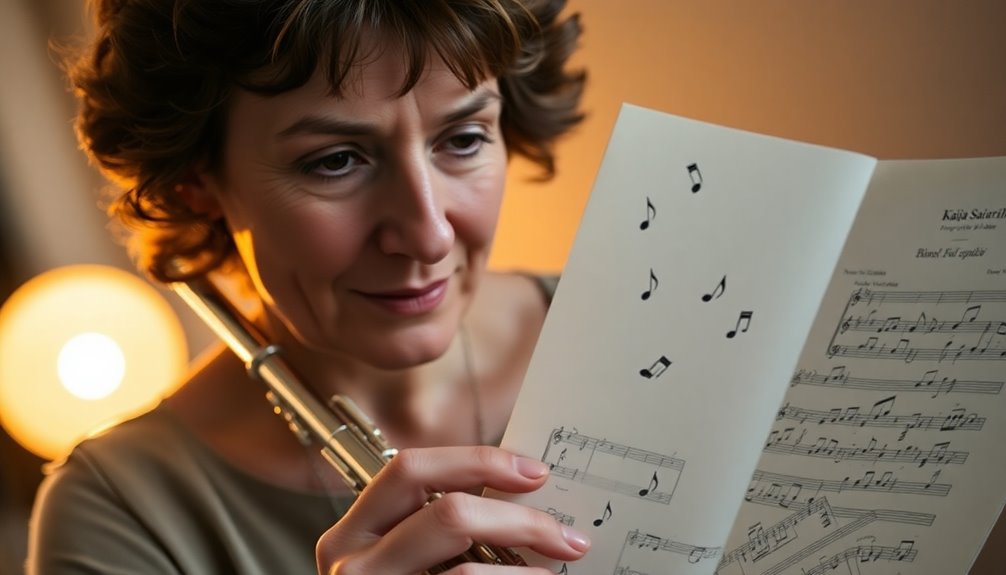
While Ian Clarke's compositions spotlight innovative techniques for the modern flute, Kaija Saariaho brings a unique voice to the contemporary repertoire that deeply influences how flutists engage with sound. Her work reflects a profound understanding of sonic textures, utilizing the flute not just as an instrument but as a vessel for exploration.
You'll find that her compositions invite you to explore the subtleties of sound, creating an atmosphere that challenges traditional boundaries. Saariaho's minimalist influences are evident in her approach, where simplicity often masks complexity. This layering of sound encourages flutists to experiment with tone, dynamics, and phrasing, fostering a sense of intimacy between performer and audience.
When you play her pieces, you're not merely executing notes; you're creating an experience that resonates on multiple levels. Her works, such as "Ciel d'hiver" and "Aile du songe," showcase how she embraces silence and space, allowing you to contemplate each sound's impact.
This focus on sonic textures not only broadens your technical skills but also deepens your emotional connection to the music. In a world often dominated by rapid-fire compositions, Saariaho's thoughtful, immersive style creates a sanctuary where you can truly belong.
Philip Glass
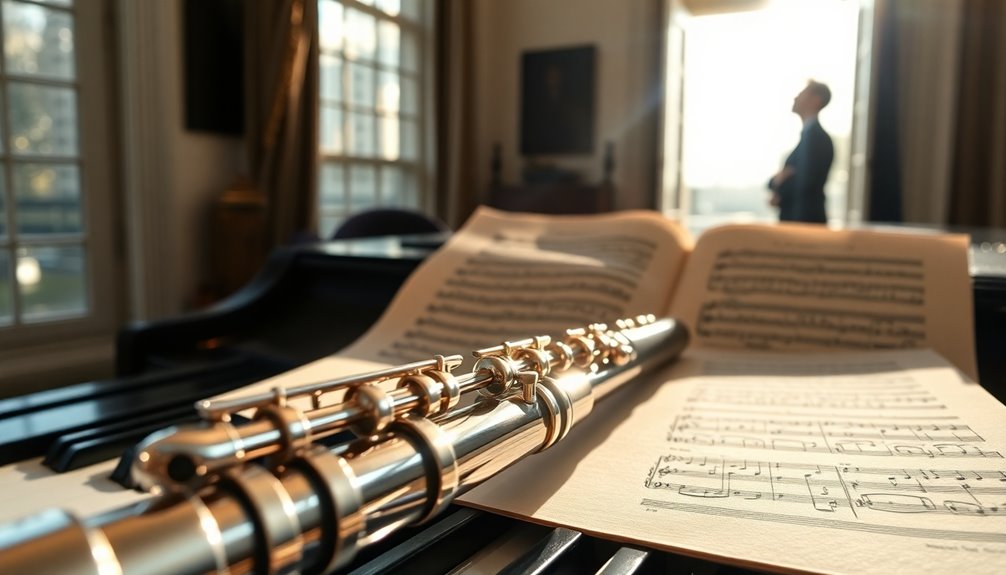
Philip Glass stands as a towering figure in contemporary music, particularly known for his minimalist approach that has left an indelible mark on flute repertoire. His innovative use of minimalist techniques has transformed how you might approach playing and interpreting contemporary works for the flute. Glass's compositions often feature repetitive motifs and gradual harmonic shifts, creating a mesmerizing soundscape that offers both challenge and beauty.
As you explore his works, you'll notice the seamless integration of various contemporary influences—from world music to avant-garde elements. These influences not only broaden the listener's experience but also expand the flutist's interpretive palette. Pieces like "Concerto for Flute and Orchestra" showcase his skill in crafting intricate lines that demand both technical precision and emotional depth. The flute becomes a voice that transcends mere notes, inviting you into a dialogue with the audience.
In studying Glass, you'll discover that his minimalist approach doesn't confine creativity; rather, it liberates it. The simplicity of his motifs allows for personal expression, encouraging you to find your unique interpretation within the framework he provides.
As you immerse yourself in his music, you'll appreciate how Glass challenges you to connect with both the instrument and the listener on a deeper level.
Ultimately, engaging with Philip Glass's works enriches your repertoire and fosters a sense of belonging within the modern music community, where innovation and tradition coexist harmoniously.
Jennifer Higdon
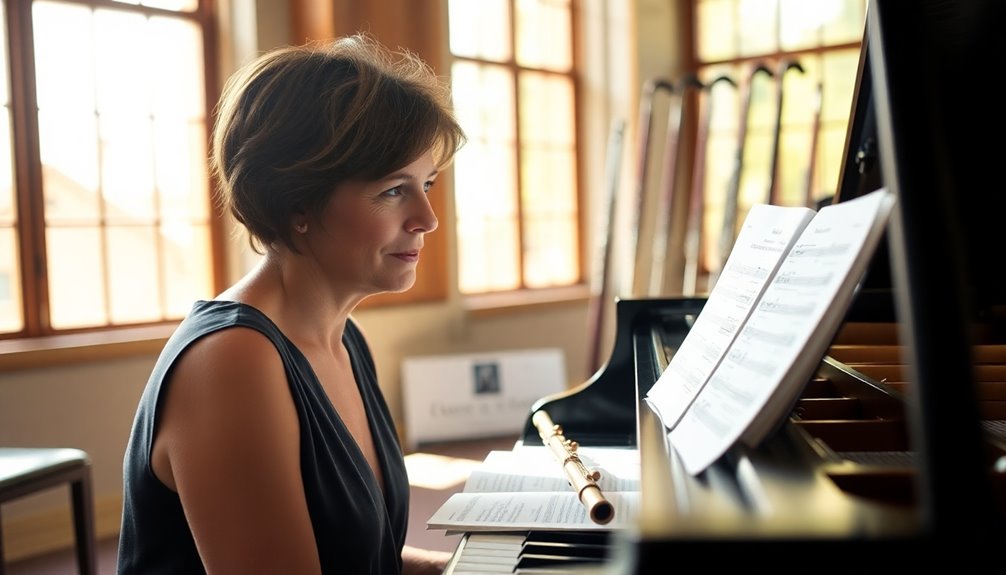
Building on the innovative spirit of contemporary composers, Jennifer Higdon emerges as a significant voice in modern flute repertoire. Her compositions often explore rich textures and utilize unique flute techniques, inviting performers to stretch their artistic boundaries. Higdon's works resonate with contemporary motifs, blending lyrical lines with complex rhythms, making them accessible yet challenging for flutists.
Her remarkable piece, "Dusk," showcases her ability to meld traditional and avant-garde elements. You'll notice how she employs extended techniques—flutter-tonguing and harmonics—that convey emotion while pushing the envelope of the flute's capabilities. Here's a brief overview of some notable works:
| Work | Description |
|---|---|
| "Dusk" | A poetic exploration of sound and silence. |
| "Concerto for Flute" | A vibrant dialogue between the soloist and orchestra. |
| "Rapid Fire" | A dynamic piece that emphasizes agility and precision. |
Higdon's music often invites you to investigate a world where the flute becomes a voice of its own, reflecting her deep understanding of its potential. By embracing her contemporary motifs, you'll find a sense of belonging within the modern flute community. As you engage with her works, you'll not only enhance your technical skills but also connect with the emotional depth that defines Higdon's artistry. Enjoy the journey of discovery with her compositions and celebrate the evolution of flute music in the 21st century.
Edgard Varèse
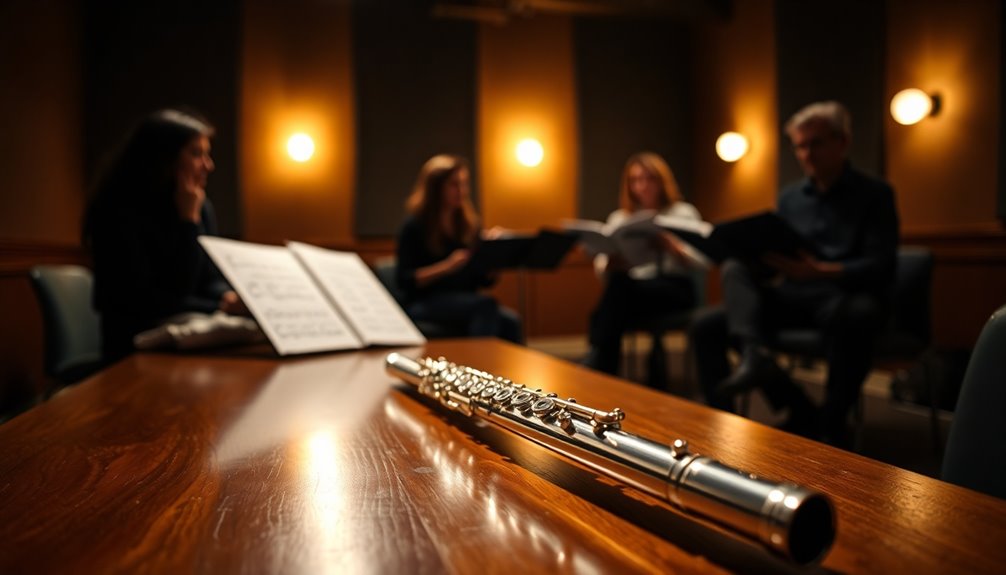
Exploring the innovative landscape of modern music, Edgard Varèse stands out as a pioneering figure whose contributions have profoundly influenced the flute repertoire. His avant-garde influences reshaped not only how you perceive music but also how you approach the flute itself.
Varèse viewed the flute as more than just an instrument; he saw it as a vehicle for exploring new soundscapes and techniques. In pieces like "Density 21.5," you'll find a stunning marriage of traditional flute techniques and experimental methods. Varèse pushed the boundaries of what the flute could do, inviting you to explore extended techniques such as flutter-tonguing, multiphonics, and even pitch bending.
These innovations encourage you to expand your expressive capabilities and challenge conventional playing. His music often draws from various cultural influences, reflecting the diverse world around him. This eclecticism invites you to immerse yourself in a rich tapestry of sounds, encouraging a sense of belonging to a broader artistic community.
When you engage with Varèse's works, you're not just playing notes; you're participating in a dialogue about the evolution of music itself. As you explore the flute repertoire influenced by Varèse, you'll discover the freedom he championed for musicians.
His vision continues to resonate, urging you to seek out your unique voice while embracing the avant-garde spirit. In this way, Varèse's legacy isn't just historical; it's a living inspiration that empowers you to redefine what's possible on the flute.
André Jolivet
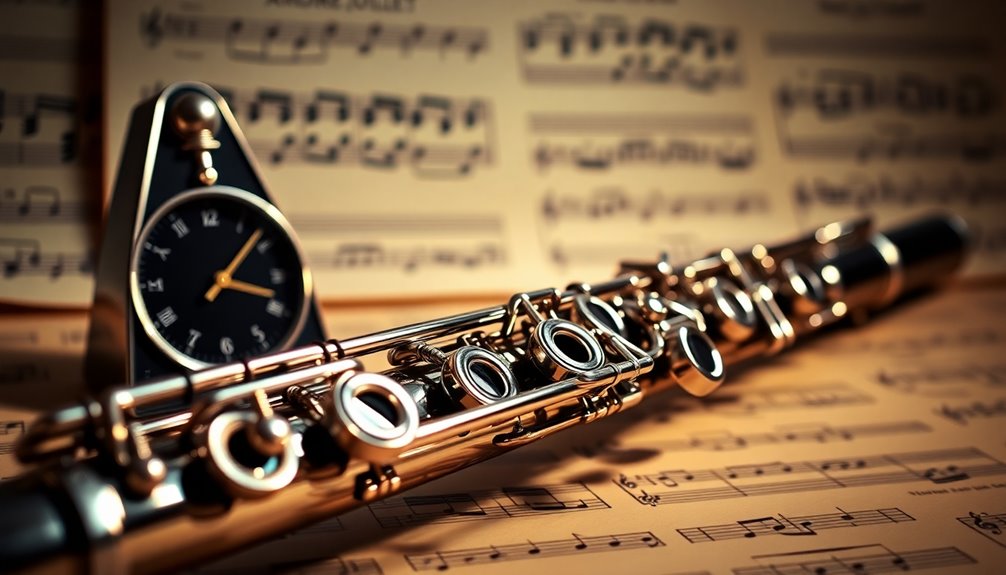
Among the luminaries of modern flute composition, André Jolivet emerges as a compelling figure whose work seamlessly intertwines tradition and innovation. His compositions reflect a deep understanding of various musical styles while pushing the boundaries of what the flute can express.
You'll find that Jolivet's influences are remarkably diverse, drawing from ancient music, Eastern philosophies, and even the rhythms of nature. This rich tapestry informs his approach, allowing you to appreciate the way his pieces resonate with both the past and the present.
Jolivet's flute techniques are particularly remarkable. He often employs extended techniques, such as multifonics and flutter-tonguing, which challenge performers and captivate listeners. These techniques not only showcase the versatility of the flute but also encourage you to explore new soundscapes.
In works like "Cinq Incantations," you'll experience how he transforms simple melodic lines into intricate, ethereal dialogues that evoke a sense of spirituality and introspection.
As you explore Jolivet's repertoire, you'll discover that his music is more than just technically demanding; it's also deeply expressive. His ability to blend lyrical passages with bold, rhythmic complexities creates a dynamic listening experience.
By engaging with Jolivet's compositions, you're joining a community that values innovation in flute music, embracing both the challenges and rewards of this extraordinary repertoire.
Brian Ferneyhough
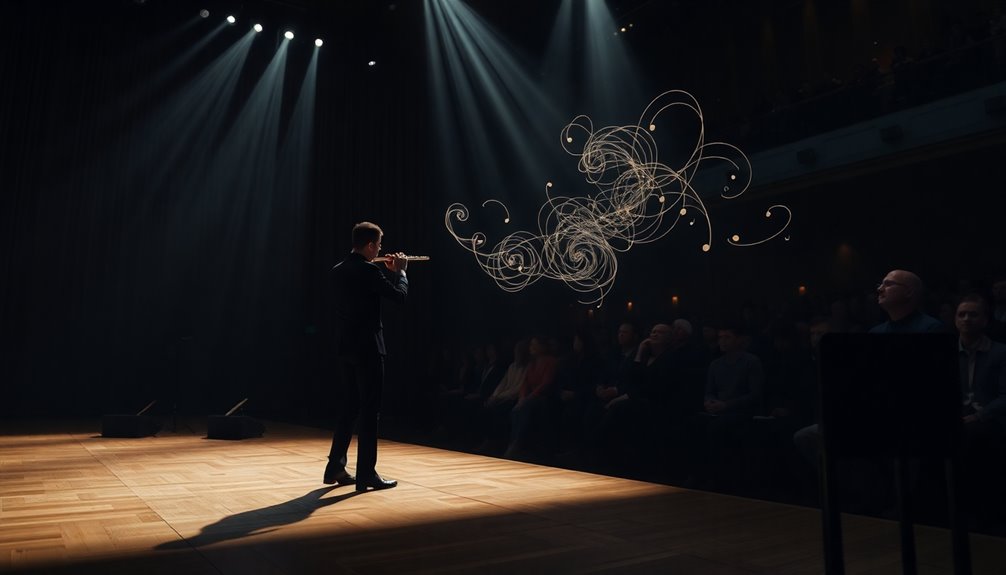
While exploring the domain of contemporary flute music, you can't overlook Brian Ferneyhough, a composer known for his intricate and intellectually demanding works. His contributions to the contemporary repertoire are transformative, pushing the boundaries of what the flute can express.
Ferneyhough's compositions often challenge performers with their complexity and the use of extended techniques, inviting you to explore new textures and sonic possibilities.
One of the most striking aspects of Ferneyhough's music is his meticulous attention to detail. Each piece requires deep engagement, not just with the notes but also with the underlying concepts. You'll find that his scores often demand a level of precision and virtuosity that can be intimidating yet exhilarating.
Extended techniques, such as flutter-tonguing, harmonics, and multiphonics, are prevalent in his work, encouraging flutists to expand their skill set and embrace unconventional sounds.
Moreover, Ferneyhough's compositions invite dialogue within the contemporary music community. They provoke discussions around interpretation, performance practice, and the evolution of the flute's role in modern music.
As you explore his works, you'll discover a rich landscape of ideas that resonate with both performers and listeners alike.
In embracing Ferneyhough's music, you're not just playing notes; you're participating in a broader conversation about innovation and artistry in the flute repertoire.
Frequently Asked Questions
What Inspired These Composers to Write for the Flute?
When you explore what inspires composers to write for the flute, consider the flute repertoire's evolution and the various influences they draw from.
Many composers are captivated by the instrument's unique timbre and expressive capabilities, leading them to experiment with new techniques. They often seek to reflect contemporary themes, blending traditional elements with modern perspectives, creating works that resonate deeply with audiences.
This connection fosters a sense of belonging, inviting listeners into a shared musical experience.
Are There Any Notable Flute Competitions Featuring Their Works?
When it comes to flute competitions, you'll find that they often serve as a stage for composer showcases.
These events not only highlight your skills but also bring attention to contemporary works. Many competitions feature pieces by notable composers, allowing you to explore fresh repertoire.
Participating in these competitions can open doors, connecting you with fellow musicians and composers, making it a great opportunity to deepen your passion for the flute.
How Have These Composers Influenced Contemporary Flute Techniques?
Contemporary flute techniques have evolved considerably, thanks largely to innovative composers.
You'll notice how they've embraced extended techniques, like multiphonics and circular breathing, pushing the boundaries of what the flute can achieve.
These contemporary styles enrich your playing, allowing for greater expression and creativity.
When you explore these techniques, you connect with a larger community of musicians who share a passion for pushing the flute's capabilities, making your journey as a flutist even more rewarding.
What Are Some Essential Recordings of Their Flute Compositions?
You might've noticed how essential recordings shape your understanding of flute repertoire. Immerse yourself in works by contemporary influences like Kaija Saariaho or Ian Clarke.
Their compositions, such as "Ciel d'hiver" or "The Great Train Race," showcase innovative techniques and emotional depth. Listening to these pieces not only enhances your appreciation but also connects you with a community that values modern artistry.
Exploring these recordings can inspire your own musical journey.
Are There Any Common Themes in Their Flute Works?
When analyzing the flute works of modern composers, you'll notice common themes centered on musical innovation and stylistic diversity.
These artists often experiment with unconventional techniques and sounds, pushing the boundaries of traditional flute music. You might hear elements of jazz, folk, and electronic influences, creating a rich tapestry that invites exploration.
Embracing these themes not only enhances your appreciation but also connects you to a vibrant community of fellow music enthusiasts.
Conclusion
In exploring the works of these renowned modern flute composers, you're not just listening to music; you're witnessing a transformation akin to the alchemy of ancient myths. Each composer, from Clarke's ethereal textures to Higdon's vibrant harmonies, invites you to experience the flute in a new light. As you probe deeper, you'll find their innovative approaches resonate like the whispers of a hidden forest, beckoning you to uncover the rich tapestry of contemporary flute music.

